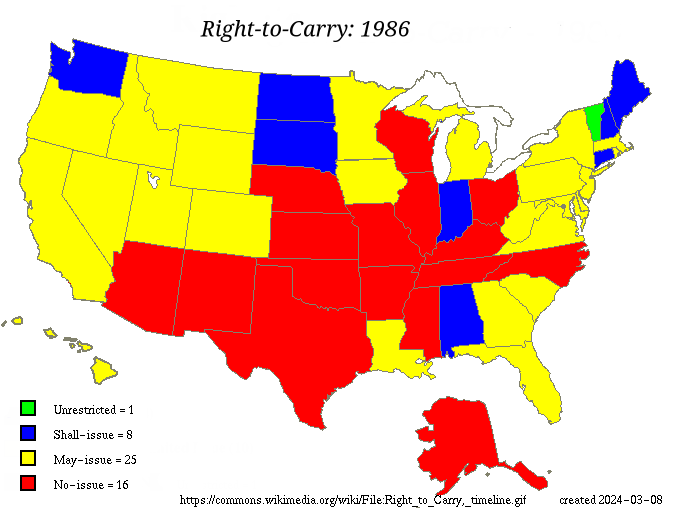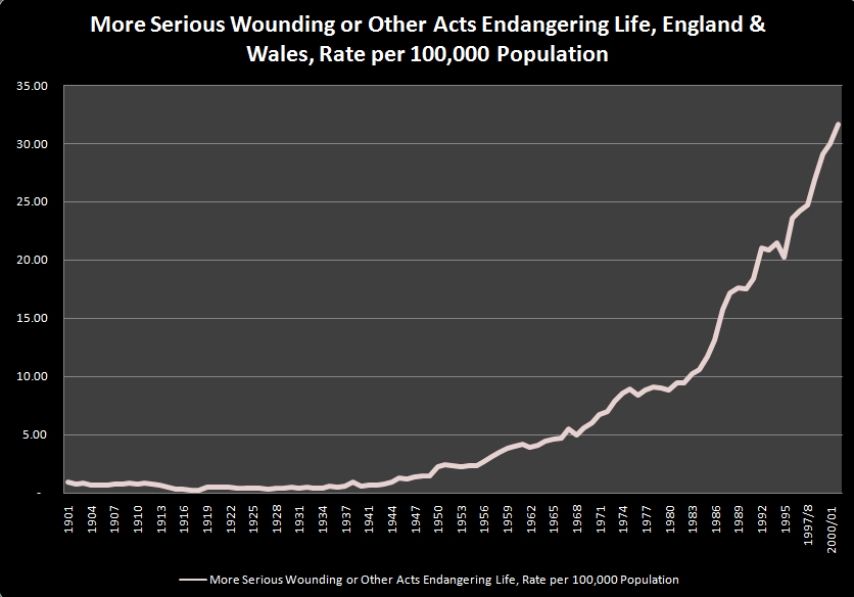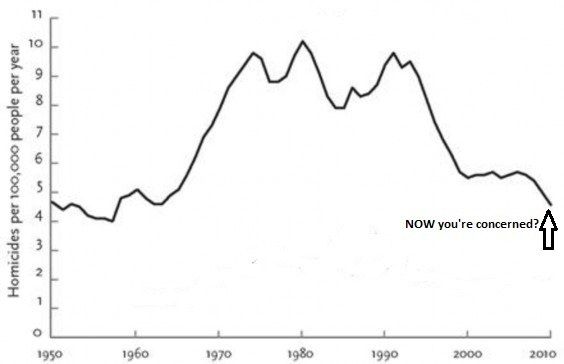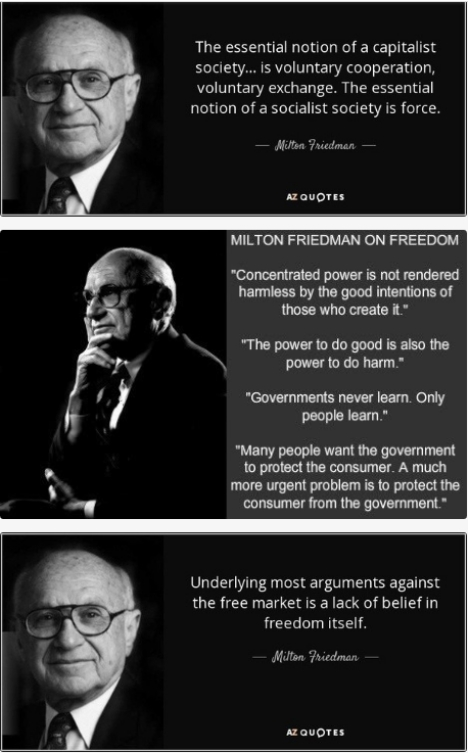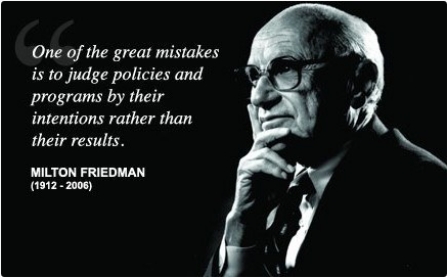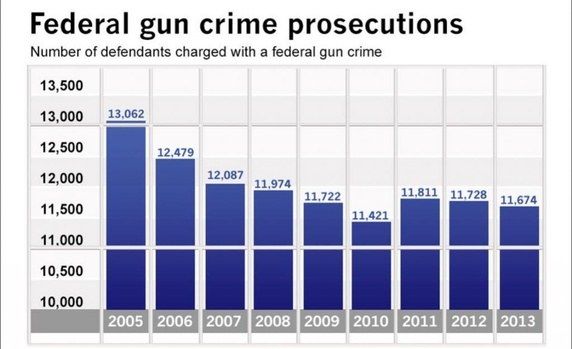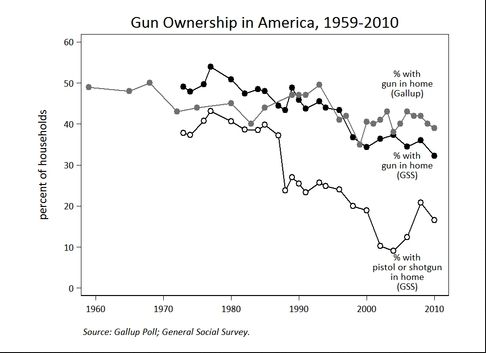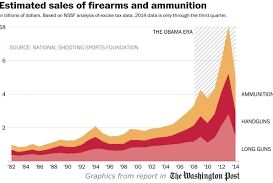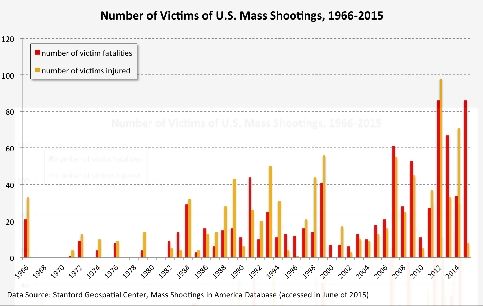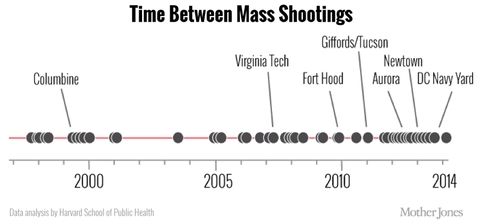So somebody over at Quora asked: Why haven’t gun control advocates commented about the Broken Arrow, Oklahoma home invasion shootings?
One Jim Page answered:
The perspective of someone who lives in a country with gun control:
3 people are now dead who would probably otherwise still be alive. The decision as to whether they should live or die was taken by someone who’s only qualification was that they had $300 to spend on an AR15.
The 3 invaders probably felt empowered to enter the victim’s home because they had easy access to guns.
Of course invading that person’s home was wrong, but wrong enough to be killed for?? Without knowing more about the incident, can you categorically say that the invaders meant the victim physical harm? It’s more likely they wanted money or stuff they could sell, and planned to use their weapons to pacify the home owner. Is a person’s TV or the contents of their wallet more important than 3 people’s lives?
Gun control advocates don’t need to comment, because this is an insane conversation that could only be had by people that feel it’s more important to own guns than to be right.
Paul V. Wilson commented:
On #2, one of the invaders had a large knife and the two others had brass knuckles, either of which can easily be a deadly weapon. None of them had guns.
On #3, I’m not sure why, on a moral basis, anyone who invades a person’s home should have any expectations of surviving. If they didn’t mean to cause harm, why did they go in with weapons? Is the homeowner supposed to think people entering his home wearing masks and holding weapons don’t mean to cause him harm?
To which Mr. Page replied:
On #2: if they didn’t have guns isn’t shooting them all with a semi automatic weapon even more of an appalling overreaction?
On #3: it’s illegal to break into someone’s home, and the law puts people behind bars for it. It doesn’t give them the electric chair or even life imprisonment. So why should someone expect to lose their lives for breaking and entering? There is a long way between a person being allowed to kill a person for being in their house, and the legal penalty for breaking and entering, and that seems to be bridged by the idea ‘that’s what happens when people own guns’. I don’t see how legal ownership of a lethal weapon can make that right.
I was reminded of my 2004 trilogy of posts beginning with “(I)t’s most important that all potential victims be as dangerous as they can“, so I started with this:
Mr. Page:
You perfectly illustrate the difference in the attitude toward violence exhibited by residents of the UK vs. residents of the U.S., I think. To wit: “(I)f they didn’t have guns isn’t shooting them all with a semi automatic weapon even more of an appalling overreaction?”
Col. Jeff Cooper, a man who pretty much helped develop civilian firearms training once commented:
“One bleeding-heart type asked me in a recent interview if I did not agree that ‘violence begets violence.’ I told him that it is my earnest endeavor to see that it does. I would like very much to ensure — and in some cases I have — that any man who offers violence to his fellow citizen begets a whole lot more in return than he can enjoy.”
In the UK the law pretty much restricts the citizen to “proportional” response – that is, in a situation of extreme stress the victim of the attack is supposed to assess the intention and capability of the assailant(s) and limit his or her response to something that will not be judged an “overreaction” by calm and sober third parties after the fact. Instead in the U.S. overwhelming response is considered appropriate, not appalling. As one popular cartoonist here has stated it, “There is no overkill. There is only ‘open fire’ and ‘reloading.’”
“(W)hy should someone expect to lose their lives for breaking and entering?”
They didn’t die for breaking and entering. Had the house been empty they’d have been fine. What they did was an armed home invasion. The concept of pacifism as it pertains to crime is generally predicated on the concept that all life is of value, and that using violence to injure or kill in defense of mere property is – as you suggest – disproportionate, the value of the material being much less than the value of the lives of the persons attempting to take the material. Surprise! I concur. The life of a human being is of greater value than, say, the contents of my wallet or my home. But this ignores something more important – the fact that the contents of my wallet or home are the least things at risk. Because someone willing to threaten bodily injury or death in order to take my property violates the tenets of the society in which both of us live. He puts in fear not only me, but the entire society. He has proffered a new social contract – “Give me what I want, and I might not hurt you.”
The pacifist culture tells us that we should not resist, that we should call the authorities who are empowered to deal with social miscreants. At most, we should respond (as the British are required) proportionally. Yet a proportional response requires us to read the mind of the assailant. If he holds a knife, are we to ask “Do you actually intend to use the knife, and if so is your intent simply to wound or would you be intending a killing blow?” A proportional response requires the defender to reason cogently in a situation wherein our lives, or at least our health may be at risk. The advantage belongs to the attacker, and that is a recipe for social disaster.
To prevent that social disaster, the new social contract offered by the criminal should be understood by all parties to be: “Whatever it is I want, I have decided that it is worth risking my life for.” And we, the potential victims, should be as dangerous as possible.
So long as a sufficient number of us are, the rest of society will enjoy the benefit of our protection. When there are too few of us, or when those of us who are willing to resist are restricted by law from doing so, there remain only two options: suffer the onslaught of criminals, or increase the police forces to overly burdensome levels. With the second option, assuming that a sufficient level is attained to reduce crime, the officers of the State required to accomplish that task will not then be reduced, they will be reassigned to other tasks, and a de facto police state will exist.
Those are the choices. It seems apparent which Britain has decided on, and which the U.S. has.
Mr. Page upvoted my comment and replied:
I appreciate your long and reasoned response. I mostly agree with you right up to ‘ … and that is a recipe for social disaster.’ It’s not. It’s a recipe for dialling down the violence, and in the case of most developed countries it works, there simply is less violence, and we absolutely prefer it that way. Second: your assertion that the only alternative to the US solution is a police state – and that’s what the Uk has chosen … can you explain what you mean by that? If you had spent any time in the Uk you’d know that it simply isn’t true.
Look it seems to me that one area of disagreement that we have is whether or not an armed person in your house is attacking you or not, if they do not know you are there. It seems that US thinking is that they are. I, and most people in the Uk I suspect, are not comfortable with that, whatever ‘Castle Law’ says. It seems like an amoral solution to a moral problem, with the side effect that there is an upward cycle of up-gunning arms race between criminals and non-criminals. Who does that benefit aside from Messrs Smith and Wesson?
To which I responded:
“It’s not. It’s a recipe for dialling down the violence…”
I suggest you study the rates of violence in the UK from the turn of the 20th Century until the present. Specifically the period right at the middle of the century when laws making self-defense with a weapon essentially impossible were enacted. I guarantee you, violence did not go down.
“Second: your assertion that the only alternative to the US solution is a police state – and that’s what the Uk has chosen … can you explain what you mean by that?”
I suggest you check your reading comprehension: “When there are too few of us, or when those of us who are willing to resist are restricted by law from doing so, there remain only two options: suffer the onslaught of criminals, or increase the police forces to overly burdensome levels.”
You have chosen the former. England and Wales used to be one of the least violent nations in the world. It is now one of the most violent nations in Europe. Sure, you don’t kill each other much (and you never did) but violent crime there is epidemic. See: https://www.gov.uk/government/up… (XML file) Pay particular attention to the column marked “Total violence against the person” and the numbers following passage of the Prevention of Crime Act 1953. You may not consider that “social disaster,” but levels of violence like that here resulted in people buying guns.
“It seems like an amoral solution to a moral problem, with the side effect that there is an upward cycle of up-gunning arms race between criminals and non-criminals.”
Yeah, we keep hearing that one – “More guns = more crime” – except it hasn’t happened. Over the last decade something on the order of sixty million new firearms were purchased by individuals here, about half of them handguns, and most of those weren’t purchased for target shooting. Concealed-carry laws, for instance, have been gaining popularity around the country – see this graphic:

The states marked in green do not require a license to carry concealed. And what has violent crime done here? DECLINED. To levels not seen since the 1960’s.
5 facts about crime in the U.S.
Who has it benefited? Our general population. Who has benefited from the UK’s policy of disarmament and “proportional response”? The criminals. Which is more amoral – allowing people to defend themselves, or in effect telling them instead to “close your eyes and think of England”?
We’ll see if he has anything to add.
UPDATE, 4/12: Mr. Page indeed posted a response. I have replied. See below:
Kevin, I can see we are not going to agree on this, but just to set the record straight: when you compare figures between the US and UK, you will find that the US and the UK do not define ‘violence’ the same way. The UK definition is much broader, and the UK numbers include such things as bicycle theft and domestic violence, which the US numbers do not. Also – it’s hard to compare ‘home invasion with intent to harm’ between the UK and the US as the UK doesn’t really classify crimes that way, or at least not that I have been able to find. If you equate burglary (breaking and entering to commit a crime), then the US and the UK are in pretty much the same ball park. But if you look at gun-related crime … the US leaves everyone else in the dust. The numbers are further skewed as it seems that in the US unreported crime is much higher than the UK. But the headline feature, surely, has to be the number of people killed by guns. Take a look here for more up to date and detailed figures than you provided: United Kingdom vs United States: Crime Facts and Stats
To your point regarding historical crime stats, the key time points you miss are the tightening of the rules after the Hungerford and Dunblane massacres, where automatic weapons and handguns (respectively) were outlawed and other guns began to be properly controlled. For a brief period after Hungerford, gun crime actually increases. But after the rules are tweaked and enforcement is perfected (and by the way it was NOT draconian, my family owned a number of shotguns and all was done fairly and reasonably, and yes! I like firing guns!), the numbers fall off a cliff. Take a look at this Guardian article, sorry about the rather antagonistic title: So, America, this is how other countries do gun control
‘Yeah, we keep hearing that one – “More guns = more crime” – except it hasn’t happened.’ Look at US gun crime figures compared to everywhere else on the planet. Why is not obvious that if you have guns you have gun crime and without guns you don’t?
One thing: I am not putting forward the UK as an example of perfect gun control. There are better. From the article above, take a look also at Germany. German gun ownership is almost as high per capita as the US, but their gun crime is ridiculously low, and dropping, because they positively vet people that apply to have guns … and only sane people are allowed them. That’s probably how it should be done. Can we agree that only sane people should have guns?
Regarding ‘close your eyes and think of England’ 🙂 The calculation is: in the incredibly rare case where someone actually breaks into my house armed, I will find a way to come out of it unscathed, either by bargaining, or self defence, or running, because the alternative, everybody up-gunned and shooting to kill, is worse. Most people here find a baseball bat or a kitchen knife a sufficiently comforting deterrent. I don’t think you’ll find most people in this country would sit around and do nothing if their home is invaded, we are not pacifists :)! But having a gun makes it too easy to end up with everybody dead. I suppose you could say criminals do benefit, because they don’t end up dead.
Yes – I did misread the section on ‘police state’ – my apologies.
OK, get an adult beverage and settle in:
My apologies, I’ve been AFK all day, and I certainly wasn’t going to try to reply to this on my iPhone. Let us begin:
“…when you compare figures between the US and UK, you will find that the US and the UK do not define ‘violence’ the same way. The UK definition is much broader, and the UK numbers include such things as bicycle theft and domestic violence, which the US numbers do not.”
And that doesn’t really matter, because the statistics I pointed you to were exclusively for your nation. Let’s look at “More serious wounding or other acts endangering life” for example.
1950: 1,078 incidents
1960: 1,847
1970: 2,956
1980: 4,390
1990: 8,920
Your population didn’t grow that much over that period (about 45 million in 1950, about 50 million in 1990). So the rate of this specific violent crime increased from about 2.4/100,000 population in 1950 to 17.84/100,000 in 1990. That’s over a 700% increase in 40 years, and the numbers nearly doubled again by the end of the century.
You are not safer than you were in 1960.
“But if you look at gun-related crime … the US leaves everyone else in the dust.”
Only if you cherry-pick the nations you compare us to. Internationally the heavily-armed U.S. ranks about 100th for homicide. Think about that. What disqualified those other 99 nations from your consideration? And why do you concentrate on gun violence? The U.S. has a higher homicide rate committed without guns than England and Wales has by all methods. I will stipulate to our violent tendencies. What I won’t do is attributed those tendencies to the widespread ownership of firearms. I can riff on this subject for a few thousand words, but I’ll pass at this time.
“Take a look here for more up to date and detailed figures than you provided:”
Again, so stipulated. But I wasn’t comparing our rates to yours. I was comparing your rates over history to our rates over the same period. That says that England & Wales has gotten more dangerous over time (going from incredibly safe to notably less so) and the U.S. has gotten safer (from notably unsafe to considerably safer). Your nation has banned the tools of self-defense and made self-defense legally risky by imposing a “proportional response” requirement. Over that same period my nation has loosened the laws on self defense and the restrictions on the ability to have weapons suitable for it.
These two data points seem to contradict the gun control narrative.
“To your point regarding historical crime stats, the key time points you miss are the tightening of the rules after the Hungerford and Dunblane massacres, where automatic weapons and handguns (respectively) were outlawed and other guns began to be properly controlled.”
I’m going to skip quoting the rest of that paragraph and ask again, why the exclusive focus on gun crime? Is it somehow worse than knife crime (the latest focus of your law enforcement attention)? On physical assault with other weapons or bare hands? Because those numbers, as far as we can tell, are not improving. We can’t really tell because apparently they’re not being properly recorded.
‘Fifth of all crimes’ go unrecorded Pullquote: “The problem is greatest for victims of violent crime, with a third going unrecorded. Of sexual offences, 26% are not recorded.”
And if you can link to The Guardian, so can I: Violent crime in England and Wales is up 24%, police figures show
Makes one wonder why the numbers aren’t being recorded, doesn’t it?
“ ‘Yeah, we keep hearing that one – “More guns = more crime” – except it hasn’t happened.’ Look at US gun crime figures compared to everywhere else on the planet.”
I have. Again, why do you ignore those countries that don’t conform to your worldview?
“Why is not obvious that if you have guns you have gun crime and without guns you don’t?”
Oh, it is. This is known as a tautology. Again, why the emphasis on guns versus violence? Here is a good place to give you a quote from the conclusion of a gun control meta-study performed here in the early 1980’s at the behest of the Carter administration that addresses this question directly:
“The progressive’s indictment of American firearms policy is well known and is one that both the senior authors of this study once shared. This indictment includes the following particulars: (1) Guns are involved in an astonishing number of crimes in this country. (2) In other countries with stricter firearms laws and fewer guns in private hands, gun crime is rare. (3) Most of the firearms involved in crime are cheap Saturday Night Specials, for which no legitimate use or need exists. (4) Many families acquire such a gun because they feel the need to protect themselves; eventually they end up shooting one another. (5) If there were fewer guns around, there would obviously be less crime. (6) Most of the public also believes this and has favored stricter gun control laws for as long as anyone has asked the question. (7) Only the gun lobby prevents us from embarking on the road to a safer and more civilized society.
“The more deeply we have explored the empirical implications of this indictment, the less plausible it has become. We wonder, first, given the number of firearms presently available in the United States, whether the time to ‘do something’ about them has not long since passed. If we take the highest plausible value for the total number of gun incidents in any given year – 1,000,000 – and the lowest plausible value for the total number of firearms now in private hands – 100,000,000 – we see rather quickly that the guns now owned exceed the annual incident count by a factor of at least 100. This means that the existing stock is adequate to supply all conceivable criminal purposes for at least the entire next century, even if the worldwide manufacture of new guns were halted today and if each presently owned firearm were used criminally once and only once. Short of an outright house-to-house search and seizure mission, just how are we going to achieve some significant reduction in the number of firearms available?
“Even if we were somehow able to remove all firearms from civilian possession, it is not at all clear that a substantial reduction in interpersonal violence would follow. Certainly, the violence that results from hard-core and predatory criminality would not abate very much. Even the most ardent proponents of stricter gun laws no longer expect such laws to solve the hard-core crime problem, or even to make much of a dent in it. There is also reason to doubt whether the ‘soft-core’ violence, the so-called crimes of passion, would decline by very much. Stated simply, these crimes occur because some people have come to hate others, and they will continue to occur in one form or another as long as hatred persists. It is possible, to be sure, that many of these incidents would involve different consequences if no firearms were available, but it is also possible that the consequences would be exactly the same. The existing empirical literature provides no firm basis for choosing one of these possibilities over the other. Restating the point, if we could solve the problem of interpersonal hatred, it may not matter very much what we did about guns, and unless we solve the problem of interpersonal hatred, it may not matter much what we do about guns. There are simply too many other objects that can serve the purpose of inflicting harm on another human being.”
The estimate of 100,000,000 firearms in the early 80’s was almost definitely low. The current estimate of 300,000,000 is also probably low. But it means the problem of gun elimination hasn’t gotten any smaller. But gun violence has.
“German gun ownership is almost as high per capita as the US, but their gun crime is ridiculously low, and dropping, because they positively vet people that apply to have guns … and only sane people are allowed them. That’s probably how it should be done. Can we agree that only sane people should have guns?”
In an ideal world, yes. I’m not going to get into a lengthy discussion on the topic of American vs. European views of government authority in this thread. Suffice it to say, what you are noting as a victory of “common sense gun regulation” is more an example of a quite homogeneous culture. If I recall my history correctly, those famously law-abiding people managed to kill tens of millions of other Europeans during the 20th Century, did they not? I don’t think I’d point to them as the gun-control ideal, myself.
“Regarding ‘close your eyes and think of England’ 🙂 The calculation is: in the incredibly rare case where someone actually breaks into my house armed, I will find a way to come out of it unscathed, either by bargaining, or self defence, or running, because the alternative, everybody up-gunned and shooting to kill, is worse.”
This is an argument that I hear repeatedly. Since you admitted to missing the alternative to a police state reference in my early comment, I’ll point you to that same excerpt once again:
“So long as a sufficient number of us are, the rest of society will enjoy the benefit of our protection. When there are too few of us, or when those of us who are willing to resist are restricted by law from doing so…”
EVERYBODY doesn’t need to be armed. In fact it takes just a small percentage of the population armed and willing to benefit the rest of society. You say “I will find a way to come out of it unscathed…” You may. What about a single woman, or an elderly man?
I’ve seen this argument before too. A previous discussion yielded this bit of “wisdom” that seems to represent your position:
Consider two scenarios:
1. Attacker has a gun. Defender does not.
2. Attacker does not have a gun. Defender doesn’t either.
Self defence is possible in the second scenario while it isn’t in the first one. Is that clear now?
No. How about this instead:
If the law disarms citizens, then it can make self defense impossible where it would have been possible if the citizen was armed.
Take these incidents from 2004, for example: Vulnerable pensioners need the self-defence law changed Pullquote:
“Two women in their eighties have been brutally beaten in their own homes by burglars in the past few days….
“Annie Hendrick, an 89-year-old grandmother, was in a critical condition in a London hospital yesterday after being beaten almost beyond recognition 11 days ago.
“Sally Skidmore was attacked on her 81st birthday a week ago yesterday, as she sat in an armchair watching television at home. She was punched repeatedly in the face and was left with two black eyes, a swollen jaw and a bleeding nose.”
Let’s ignore the Telegraph’s call for allowing women like these to possess at least pepper spray to defend themselves with. I doubt seriously that the perpetrators of these crimes began their criminal careers with the assaults on Ms. Hendrick and Ms. Skidmore. More likely they’ve been doing similar crimes, perhaps without the assault and battery, for some time. Had they met someone armed and willing to shoot, might that not have ended their careers before either lady had the misfortune to meet them? How many other crimes might have been prevented? We literally can’t know. But what we do know in the Oklahoma incident is that the three perpetrators of that home invasion will not be recidivists.
“Most people here find a baseball bat or a kitchen knife a sufficiently comforting deterrent.”
A kitchen knife did not work out so well for Mr. Brett Osborne: Five years in prison for acting in self-defence Pullquote:
’The law,’ explains Harry Potter, the barrister who, with Charles Bott, would defend Osborn, ‘does not require the intention to kill for a prosecution for murder to succeed. All that is required is an intention to cause serious bodily harm. That intention can be fleeting and momentary. But if it is there in any form at all for just a second – that is, if the blow you struck was deliberate rather than accidental – you can be guilty of murder and spend the rest of your life in prison.
‘Moreover,’ Mr Potter continues, ‘while self-defence is a complete defence to a charge of murder, the Court of Appeal has ruled that if the force you use is not judged to have been reasonable – if a jury, that is, decides it was disproportionate – then you are guilty of murder. A conviction for murder automatically triggers the mandatory life sentence. There are no exceptions.’
Pour encourager les autres, as the Froggies put it?
“I don’t think you’ll find most people in this country would sit around and do nothing if their home is invaded, we are not pacifists :)!”
When defending oneself or others can get you jailed, then sitting around and doing nothing might be an option.
“But having a gun makes it too easy to end up with everybody dead.”
Despite the fact that I can give you link after link to incidents were ether the perpetrator ended up captured (wounded or unwounded), driven off, or killed, while the defenders suffered little to no injury. What do you say to those people? They shouldn’t have had a gun?
“I suppose you could say criminals do benefit, because they don’t end up dead.”
Or wounded. Or captured. Or driven off to consider a safer career path. No, they get to keep on victimizing others. And society loses.
Damn, but I do enjoy these.
UPDATE 4/14: And another round:
As I say, we will not agree. Of course you can cherry pick stories in the UK news where a person comes to grief who would have been better off armed, and the daily mail and telegraph are great places to start looking. And of course there are cases where the tabloids can make out that the victim is unfairly punished for defending himself – I assure you that if you look into the case it will not be quite as simple as you suggest, the legal system is quite sane here in general. And for every article you cite where there is a positive outcome where an armed victim saved themselves, I’ll cite one where a child kills themselves or someone else with a gun sitting on a table at home, or a school massacre, or some other ghastly avoidable gun accident or crime occurs.
Is our system perfect? Of course not! But we think it’s OBVIOUSLY miles better than your alternative.
Regarding countries not on the list: who do you want to include? From that guardian article:
If you want to include Honduras, Venezuela, Swaziland, Guatemala, Jamaica, El Salvador, Columbia, I have no problem with that, but I’m not sure it helps your cause to compare the US to countries like that. Isn’t it more useful to consider countries that are a bit less chaotic? I note also that the top 2 Euro countries in the list, Finland and Switzerland the vast majority of gun killings are suicides! But that’s a separate problem. Source here: List of countries by firearm-related death rate – Wikipedia
Regarding historic data – I see where you are coming from, and I agree that the long term is generally the best we to look at trends, but the key point you are missing is that during the majority of the 20th century, in the UK you could own a semi-automatic weapon, rifle, handgun or shotgun, with a little bit of paperwork and a clean criminal record. We have only really been doing proper gun control since legislation following the Dunblane massacre in 1996, finally enacted after massive public pressure in 2003. Here’s Uk gun crime chart from 1990 to the present:
I have no idea why the number increased so markedly up to 2002 or so, but since then the trend has been pretty clear, do you agree? But before 2003, the Uk did not have effective gun control, so am not sure that you can read anything useful into the prior data.
I understand you feel that having guns around overall reduces all crime. That may be so or it may not be (my gut feeling after scanning a lot of data is that the US and the UK are in the same ball park where it comes to non-violent crime, so gun ownership has little effect overall on non-gun crime, but I could well be wrong), but in this country we are more than happy to accept the consequences of NOT having every home invasion turning into the equivalent of the St Valentines day massacre, even if it means a slightly higher level of other types of crime. Yes. We feel it’s better to sacrifice a few unlucky people rather than suffer the consequences of everyone being armed to the teeth, because (sorry) we don’t want to end up like the US, having to justify the craziness of more or less anyone being allowed to own a device specifically designed to kill other human beings as efficiently as possible, by saying it makes everyone safer.
“As I say, we will not agree.”
No, we won’t, but for me the purpose of discussions like this isn’t to change your mind, it’s to put both sides of the argument up for those undecided to see and consider. Thanks for doing your part.
“I assure you that if you look into the case it will not be quite as simple as you suggest, the legal system is quite sane here in general.”
From this side of the pond, it appears that your legal system is – at best- schizophrenic when it comes to self-defense, and as a result the apparently real risk of prosecution in the event of a self-defense situation has what one person on your side grudgingly called a “chilling effect” on such actions.
“And for every article you cite where there is a positive outcome where an armed victim saved themselves, I’ll cite one where a child kills themselves or someone else with a gun sitting on a table at home, or a school massacre, or some other ghastly avoidable gun accident or crime occurs.”
I’d be happy to take up that challenge – to the point that I would be willing to bet I could give you at least three “positive outcome” stories for each “bad outcome” story you could find, but this isn’t the place for that. Nor is it the point. The question for me is, “Who gets to decide?” Who gets to decide how I choose to defend myself and my loved ones? Me? Or an entity that isn’t responsible for providing the protection that they deny to me (but still reserve to themselves)? You’ve made your choice. I’m fine with that. But I won’t live under those rules.
“If you want to include Honduras, Venezuela, Swaziland, Guatemala, Jamaica, El Salvador, Columbia, I have no problem with that, but I’m not sure it helps your cause to compare the US to countries like that. Isn’t it more useful to consider countries that are a bit less chaotic?”
But many of those nations are – judging by their laws – gun control paradises! Honduras – 6.2 (legally owned) guns per 100 population (GB has 6.6, the U.S. 112.6 according to Wikipedia), yet it is the undisputed champion of homicide worldwide. Does this not suggest to you that guns aren’t the issue as much as culture? British law has treated firearms as deodands, and now they’re doing the same to knives.
“We have only really been doing proper gun control since legislation following the Dunblane massacre in 1996, finally enacted after massive public pressure in 2003.”
Where “proper gun control” is defined as “banning and confiscating all legally-owned handguns”? What law was passed in 2003 that magically fixed everything?
The British government has been incrementally passing gun control laws since 1920 in order to reach the point in 1996 where they could pass, and more importantly implement, the handgun ban. In 1920 the Firearms Act implemented registration of handguns and rifles and restricted possession to people who could prove “good reason” to have them. At that time “self defense” was accepted as a good reason. The law was passed as a crime control measure, but when the seal on the discussions of that legislation expired in 1981 the real reason behind it came to light – fear of armed revolt by communists (read: unions) as had occurred in Russia just a few years previously.
Though Britain didn’t have Prohibition and the associated problem with Tommy-gun toting mobsters, in 1937 the machine guns that had been brought back after WWI and had been legally registered under the 1920 Firearms Act were – you guessed it – banned, along with short-barreled shotguns. American pundit Charles Krauthammer writing about our 1994 “Assault Weapons Ban” (that wasn’t) said: “It might be 50 years before the United States gets to where Britain is today. Passing a law like the assault weapons ban is a symbolic — purely symbolic — move in that direction. Its only real justification is not to reduce crime but to desensitize the public to the regulation of weapons in preparation for their ultimate confiscation.” You started in 1937. Sixty years later you had banned all but a handful of firearms after first requiring that they all be registered and after making acquisition, storage and use of them onerous and expensive. You said you owned shotguns – how many people there are willing to jump through the regulatory hoops necessary to do so?
And you were told that each and every law that was passed would make you safer. The previously mentioned Prevention of Crime Act of 1953 took away “self defense” as a legitimate reason to own a firearm or to carry any “offensive weapon” including things like pepper spray.
To make you safer.
The Criminal Justice Act of 1967 (later consolidated into the Firearms Act of 1968) required registration of all shotguns, previously considered merely “sporting arms” and gave the police the power to refuse registrations if they believed the registrant would “endanger public safety.”
To make you safer.
The 1988 Firearm Act (passed after the Hungerford massacre) had been sitting on a desk in Parliament since 1973 as a White Paper, just awaiting the proper crisis to be implemented. (As Winston Churchill – later quoted by current Chicago Mayor Rahm Emanuel – said, “Never let a serious crisis go to waste. Crisis provides the opportunity to do things you couldn’t do before.”) That one banned all semi-automatic and pump-action centerfire rifles and changed shotguns that could hold more than two shells into “firearms” that required the more stringent license required for rifles and handguns.
To make you safer.
Then after Dunblane all centerfire handguns were banned effective October 1997. All other handguns were banned effective February 1998.
To make you safer. Home secretary Alun Michael said after passage of the handgun ban: “This is an important step towards improving the safety of the public after the terrible events of Dunblane. Britain now has some of the toughest gun laws in the world. We recognize that only the strictest control of firearms will protect the public.”
But only after 2003 did you get truly effective gun control? Again, what was the magical change? And did it make you safer? Again, check your statistics. Historical crime data indicates not. Using the data there for “Total Violence Against the Person” minus “Violence without injury” for the period of 1990 – 2014/15 this is the graph I get:

What happened after 2001 to cause that massive spike? It wasn’t just gun crimes that increased. What law was passed after 2003 that caused it to drop? And why were there still over double the number of incidents in 2015 than in 1990? Your population hasn’t grown that much over 25 years. Based on a fixed population of 55 million, the rate in 1990 would be about 327/100,000. In 2014/15 about 650/100,000.
We don’t keep track of statistics the same way, but Aggravated Assault here generally involves a weapon or injury of some sort, so it’s at least comparative. In 1990 our aggravated assault rate was 424.1/100,000. In 2015 it was 237.8.
With our lax gun laws.
So, are you safer? You’ve traditionally never killed each other very often, so you get what I call “OMGWTFBBQ?!?” headlines like Murder rate in England and Wales rises 11%. Yeah, 573 dead. So an 11% increase is an extra 63 deaths, or two guys driving lorries through crowds of holiday shoppers. But you’re beating, stabbing and bludgeoning each other at two and a half times the rate we are.
Are you safer? Safer than you were in 1990? Safer than you were in 1960? Because we’re just about as safe now as we were in the 1960’s and we have a lot more guns than we had then, and much more leeway in their use in self-defense.
My argument isn’t that guns necessarily make us safer, it’s that disarming the public DOESN’T. And the numbers appear to back me up, because I’m not fixated on the tools of violence, but the ACT.
I get the feeling this one’s petering out.
UPDATE: Jim is still in it!
Hi Kevin – I think we could go on at this forever 🙂 Two things though really:
First, Honduras, Columbia, Guatemala etc. I honestly don’t think there’s much point in arguing that gun control there is properly enforced, do you? Are you seriously going to suggest we compare the real situation of how many people actually have guns legally/illegally between the UK, Japan, Australia, other euro countries, etc etc to these very out-there countries? I don’t think to do so does your argument much good. ‘Look – we’re miles better than Columbia’ … I should jolly well hope so!
Second: comparative numbers. There are a lot of articles out there saying that the Uk is 5 times more violent than the US. Most of these seem to link back to a survey carried out by Civitas for the Tory party in the Uk from a few years ago, designed to discredit the law and order policies of the Labour government … and it fails to take into account the different definitions for violence between the US an the UK – I believe I mentioned this in an earlier post. I have spent a little time trying to find a rigorous analysis where an honest effort is made to compare apples and apples, and I can only find one, here: Dispelling The Myth – a response to the Civitas report I refer to above. The guy links to his data sources and describes his methodology. He only uses published results, though he does point out that in similar surveys in the UK and the US, UK violent crime is under-reported by about 2x and in the US by about 4x, but that is not taken into account in the calculation. The headline results (sorted from worse in the UK to worse in the US):
You are 1.27x (58.3 / 45.8) more likely to be knifed in the UK than in the US
You are 1.1x (135.7 / 113.7) more likely to suffer robbery in the UK than in the US.
You are 1.02x (26.7 / 26) more likely to be raped as a female in the US than in the UK
You are 1.29x (229.5 / 176.9) more likely to suffer theft of a vehicle in the US than in the UK
You are 1.52x (702.1 / 460.1) more likely to suffer burglary in the US than in the UK.
You are 4.03x (4.6 / 1.14) more likely to be murdered in the US than in the UK.
You are 6.9x (241.05 / 34.7) more likely to suffer aggravated assault in the US than in the UK.
You are 35.2x (3.17 / 0.09) more likely to be shot dead in the US than in the UK.
These are absolute numbers, like compared to like as far as possible, from snapshots taken in 2013. Building a narrative based on whether crime rates go up or down year on year is not much use when comparing the UK and the US if you don’t take into account the initial starting points. Here’s at least one initial starting point and in my opinion it doesn’t make the US look good, guns or no guns, and there is no argument here at all that the UK is bludgeoning its citizens to death 3 times more than the US. That would come under either murder or aggravated assault in the figures above.
I am not making this stuff up. By all means check this guy’s sources … I have spot checked a couple of calculations (rape and knife crime) and I can’t find any errors. If you can, let me know.
If you do take into account this guys assertion that crime is underreported in the US 2x as much in the US as the UK, the situation in the US looks even bleaker.
If you can find an alternative analysis of like for like crimes between the US and the UK, please cite it.
As to why crime of any sort increases or decreases, I would say that there’s a lot more that goes into it than gun control, eg poverty, alienation, the gap between rich and poor, policing, sentencing, social security, healthcare, education etc etc. Generally the poorer and more alienated people feel, the more they commit crime. There comes a point I suspect when for some people any risk is worth taking.
Frankly the best way it seems to live in a country with low crime is to live in a country with a strong social conscience, where the disadvantaged are looked after. Not everyone’s cup of tea I know.
Out of curiosity – do you think we are the only people on the planet reading this conversation?? 😀
I’ve got to dig through that link and see what’s in it, but Jim is holding up his end of the argument with skill and enthusiasm.
UPDATE 4/18: OK, there’s been another exchange. I put up my response this evening, but copying everything over here isn’t a simple cut-and-paste exercise. Maybe tomorrow.
UPDATE 4/19: OK, here’s my latest response to Jim:
OK, I’ve read your link and explored the authors methodology, and honestly can find little to criticize except one thing – it compares one year’s data only.
Which completely avoids my point.
Going back to your opening paragraph:
“First, Honduras, Columbia, Guatemala etc. I honestly don’t think there’s much point in arguing that gun control there is properly enforced, do you? Are you seriously going to suggest we compare the real situation of how many people actually have guns legally/illegally between the UK, Japan, Australia, other euro countries, etc etc to these very out-there countries? I don’t think to do so does your argument much good. ‘Look – we’re miles better than Columbia’ … I should jolly well hope so!”
I have already stipulated to the US’s (much) greater tendency toward violence. You seem to attribute it to the presence of firearms, and I attribute it to culture. I understand we won’t reach any consensus on this, but I wanted to make the point clear. If you study world history prior to the invention of the (effective) firearm, you will note that violence was much more widespread, and the world much more lethal back then. I recommend you look at Long Term Historical Trends in Violent Crime (PDF) and The Better Angels of Our Nature.
What I was trying to get across to you was not the relative safety of the UK vs. the US, but rather the relative safety within each nation over time.
Going back to the link I provided before, Historical crime data let’s look at one data series – “More serious wounding or other acts endangering life” for the period 1898–2001/02 (all that data set is good for). Again, this data set is for “number of incidents” and per capita is more what we’re interested in, so I’ve looked up the census data and interpolated between those data points to give that measurement. As you noted, this data is restricted to the polity of England and Wales and does not include Scotland or Northern Ireland.
Here’s the graph I get:

Gun control in the UK began as I said in 1920 with the registration of firearms. Doesn’t appear that things were very violent there in 1920. In 1937 full-auto weapons and short-barreled weapons (excluding handguns) were banned. Still doesn’t look very violent. Post WWII violent crime began to inch up. The 1953 Prevention of Crime Act – passed to make you safer – removed self defense as a valid reason to carry any kind of weapon, and removed self defense as a valid reason to possess a firearm.
It apparently didn’t make you safer.
The Criminal Justice Act of 1967 and the Firearms Act of 1968 – again, passed to make England safer – didn’t.
The 1988 Firearms Act which banned semi-auto and pump-action rifles – again, to make you safer – again, didn’t.
The handgun ban of 1997? Ditto.
Now you assert that after 2003 these laws or some additional law you can’t seem to point to magically started working! Yet the current level of violent crime dwarfs what you had in the 1950s. It’s bad enough that police departments have been cooking the books to make it look better.
Met tried to silence PC whistleblower who exposed crime figures scandal
‘Fifth of all crimes’ go unrecorded – not because they aren’t reported, but because the police deliberately record them as less serious offenses or don’t record them at all.
Yes, we kill each other a lot over here, but then we always have. The UK used to be damned near idyllic. Now it’s just about average – again, excepting the fact that y’all just don’t kill each other very much. But regardless, you aren’t safer than you were.
Europeans (and others) wring their hands over our supposedly astronomical homicide rate and tell us we need to get with the 21st Century and get rid of our guns so we can be safer, just like you. I respond with this:

We’ll see if anything further develops.
